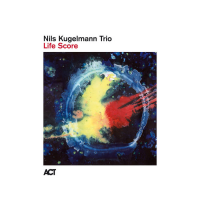Home » Jazz Articles » Album Review » Mark Masters: Sam Rivers 100
Mark Masters: Sam Rivers 100
Rivers, who died in December 2011, was an early bebopper who turned later in his career to avant-garde or "free" jazz, in which many customary harmonic conventions are abandoned in favor of spontaneity and self-determination. To his credit, Masters has rephrased the best of both genres and sewn them into big-band garments that, for the most part, sparkle, swing and suit his fourteen-member ensemble to the proverbial T. In other words, Masters takes songs that were composed for small groups playing mostly free jazz and makes many of them sound as though they'd been written especially for his larger ensemble. That is quite a trick, one that deserves a deep bow and a hearty round of applause.
The "freest" item on the agenda is the clamorous "Parts of Speech," in which the ensemble is pared to a seven-piece group whose members may have a plan in mind but basically go their own way, leaving in their wake a potpourri of largely disjointed and unwieldy phrases. "Calls of the Wild" is a close second, and this time it is the larger ensemble that pursues freedom in the name of chaos and confusion. Luckily for the listener, "Calls" runs for only three minutes before balance is recovered and everyone swings hard on the relatively forthright "Paean."
The ensemble sets the compass with "Fuchsia Swing Song," a high-energy barn-burner based on the Cole Porter standard "Night and Day" that was the centerpiece of Rivers' 1965 Blue Note album of that name. Harper solos with pianist Jeff Colella, tenor saxophonist Jerry Pinter and drummer Kendall Kay (whose rock-solid presence strengthens every number). "Cyclic Episode" and "Helix," which lead to the aforementioned "Parts of Speech," are similarly candid and lyrical, embracing trim solos by trumpeter Nathan Kay and baritone Tom Luer on "Episode," Pinter, alto Nicole McCabe, trombonist Dave Woodley and bassist Chris Colangelo on "Helix." Harper is a soloist (with McCabe and Woodley) on the upbeat "Point of Many Returns" and with Luer on the light and lovely "Beatrice."
The blues, always an indispensable weapon in Rivers' arsenal, takes center stage on the ardent "Downstairs Blues Upstairs" (solos by Harper and trumpeter Mike Cottone), which counterbalances the free-form "Calls of the Wild" and ushers in the last three numbers, each of which is melodically and harmonically forthright and pleasing. First up is the robust, brass-driven "Paean" (solos by Harper, drummer Kendall Kay and trumpeters Nathan Kay and Tim Hagans), followed by the bright and dynamic "Ellipsis" (Colella, Nathan Kay) and neatly winding "Luminous Monolith" (McCabe, Woodley, Luer, Kendall Kay). Needless to say, the ensemble is strong and seamless throughout, while Harper and the other soloists are consistently charming and resourceful.
This is a tribute that Rivers himself would no doubt have endorsed, and it's a safe bet to note that his music has seldom sounded better or landed in more deft and capable hands than these.
Track Listing
Fuchsia Swing Song; Cycl8ic Episode; Helix; Parts Of Speech; Point Of Many Returns; Beatrice; Downstairs Blues Upstairs; Calls Of The Wild; Paean; Ellipsis; Luminous Monolith.
Personnel
Mark Masters
arrangerBilly Harper
saxophoneJerry Pinter
saxophone, tenorNicole McCabe
saxophone, altoTom Luer
clarinet, bassRyan DeWeese
trumpetMike Cottone
trumpetNathan Kay
trumpetLes Benedict
tromboneFred Simmons
tromboneDave Woodley
tromboneJeff Colella
pianoChris Colangelo
bassKendall Kay
drumsTim Hagans
trumpetAdditional Instrumentation
Mark Masters Ensemble.
Album information
Title: Sam Rivers 100 | Year Released: 2025 | Record Label: Capri Records
Tags
PREVIOUS / NEXT
Support All About Jazz
 All About Jazz has been a pillar of jazz since 1995, championing it as an art form and, more importantly, supporting the musicians who make it. Our enduring commitment has made "AAJ" one of the most culturally important websites of its kind, read by hundreds of thousands of fans, musicians and industry figures every month.
All About Jazz has been a pillar of jazz since 1995, championing it as an art form and, more importantly, supporting the musicians who make it. Our enduring commitment has made "AAJ" one of the most culturally important websites of its kind, read by hundreds of thousands of fans, musicians and industry figures every month.






























